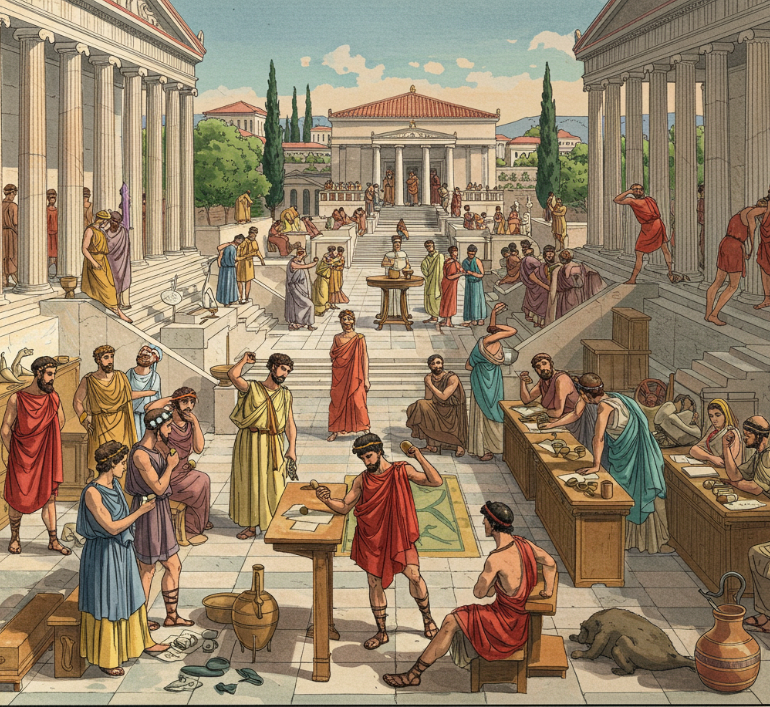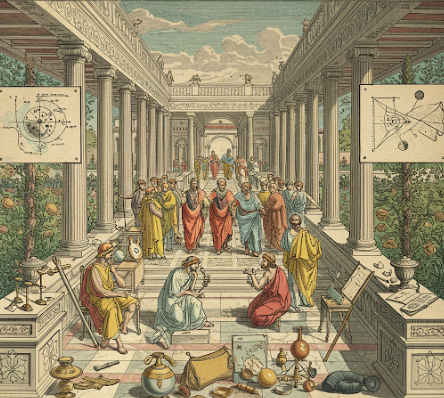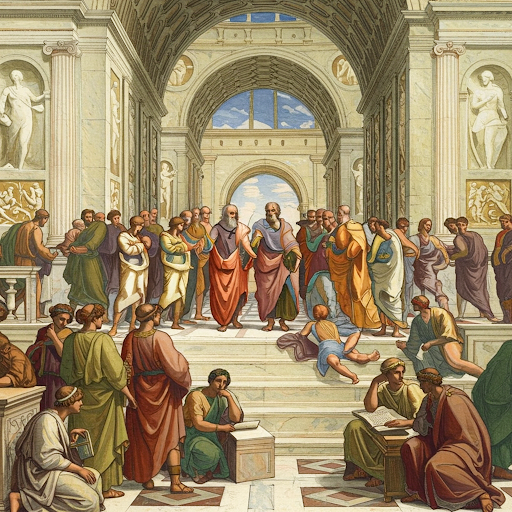You may have heard that homosexuality was celebrated in ancient Greece more than any other place and time. Some scholars have even called ancient Athens a gay paradise, where same-sex romance flourished without discrimination and prejudice. However, sexuality was framed very differently in ancient Greece than it is in the modern Western World.
A Closer Look at Homosexuality in Ancient Greece
In recent years, we have witnessed an undeniable advancement of the LGBT rights through several legal cases and political campaigns. For many years, LGBT people had to remain silent and hide their sexual preference, but that’s not the case anymore. Sociologists suggest that this is nothing but the result of decades of oppression. Like other oppressed minorities, gay people have a reason to voice their hardships and accomplishments. However, violating and altering history in the name of gay pride is not necessary.
One historical situation that is often sourced in the name of gay pride is the ancient Greek society and several ancient Greek historical figures that are falsely portrayed as gay in pop culture. The relationship between Achilles and Patroclus is an example of this. In the Iliad, Homer describes a deep and loving friendship between the two men, but never explicitly casts the two as lovers. Many modern interpreters of the story, however, have felt comfortable with using the characters’ relationship as evidence of gay glorification in ancient Greek literature and culture.
Achilles tending Patroclus wounded by an arrow, identified by inscriptions on the upper part of the vase. Tondo of an Attic red-figure kylix, circa 500 BC. From Vulci. ( Public Domain )
Alexander the Great is another popular example. Even though the available historical sources clearly indicate that the Greek king had different female lovers each night, he is considered the most famous gay man of antiquity, simply because a screenwriter in Hollywood imagined him as one. In reality, Alexander the Great most likely slept with more women than Hugh Hefner! But how did we end up with these false misconceptions about ancient Greek society and homosexuality?
The whole thing officially opened up by Kenneth Dover's work Greek Homosexuality in 1978. Since then, as MacDowell points out , homosexuality in ancient Greece “has been discussed a good deal, mainly from a sociological and anthropological point of view.” However, few mention Athenian laws against homosexuality . It wouldn’t be much of an exaggeration to speculate that a decorated and experienced historian such as Dover avoided this account of the official stance of Athens on homosexuality. Instead, he based his research and conclusions on certain pieces of such art as vase painting and the idealized depiction of homoerotic relationships described briefly by Plato in some of his works.
A painting by Charles Le Brun depicting Alexander and Hephaestion (in red cloak),
Only Seeing Sexuality
There’s no doubt that same-sex activity existed in ancient Greece, just like it always existed in every corner of the planet – in men, women, and even animals. What’s critical to understand though, is that homosexuality never flourished in Greece as so many people falsely believe today. The biggest misconception of all is that there was a term known as “homosexuality.” Contrary to popular belief, the word "homosexual" is a modern invention. It was used for the first time in 1869 by the Hungarian physician Karoly Maria Benkert (1824-1882). As noted in an article on Livius.org: “In ancient Greece, there was not a word to describe homosexual practices: they were simply part of aphrodisia, love, which included men and women alike.”
To put it simply, some Greek men didn’t discriminate when it came to sex - to them any sexual activity was just “sexuality.” Not homosexuality or heterosexuality. They framed it as more on the terms of “giving” and “receiving”. Unless you were a woman, however, it was looked down upon to enjoy receiving. Interestingly, those who enjoyed “receiving” were stigmatized within the Athenian society and were kinaidoi (men who allowed other men to penetrate them). This was a degrading word, suggesting ancient Athens, the so-called open-minded Greek city-state of antiquity, wasn’t gay-friendly at all.
The rest of the ancient Greek city-states would be classified as “macho” societies nowadays, with Sparta being disapproving of men who engaged in homosexual activities. It was a general characteristic of macho societies that being dominant (or “giving”) was noble, while being submissive (“receiving”) was the opposite. For a Corinthian or a Spartan male to deliberately choose a submissive sexual role, he was seen as a type of traitor, one who accepted being ignoble for sexual pleasure, when he could be noble.
Spartan Girls Challenging Boys (1860) Edgar Degas
If anything, the ancient Greeks viewed homosexuality as a shameful default by nature. That is why in the entire Hellenic literature of the ancient era, there is not a single description of a homosexual act, whereas there are plenty of heterosexual acts described in detail, with Zeus being one of the most prominent heterosexual alpha males of antiquity.
Greek Philosophy’s Views on Homosexuality
What we learn from Xenophon is that Socrates wasn’t a teacher who took advantage of his younger students as modern pop culture commonly presents. Instead, the legendary philosopher did not allow any physical contact between him and his younger students. According to his teachings , any kind of sexual activity or “other physical contact between a teacher and student were simply unacceptable.”
The most famous student of Socrates, Plato, is another notable ancient Greek whose writings have been totally misunderstood and taken out of context. Indeed, Plato wrote that “the only type of real love is the love between two men”, and he dedicated two of his dialogues to that subject: the Symposium and the Phaedrus. However, the kind of love he meant didn’t include homosexuality or any kind of sexual activity. James Davidson, a professor of ancient history at the University of Warwick, wonders in an article published by The Guardian , how someone like Plato who “worshiped” love between men could at the same time describe sex between men as an “utterly unholy act”. The answer is very simple.
The kind of love between two men that Plato described in Symposium focuses on the beauty of the soul above that of the body. As Plato clearly states in his works, the love (or friendship if you prefer) between two men is above the love a man has for a woman, as in most cases this kind of love includes sex. According to Plato, spiritually loving another male highlights the absolute beauty of the soul and is the epitome of selfless love that can be compared only with the love between a parent and his/her child. In other words, Plato worshiped what youngsters would nowadays describe as “bromance,” but he was strictly against what we define today as homosexuality.
Read more: https://www.ancient-origins.net/history/homosexuality-ancient-greece-0011232
References
Munro, A. (2018) ‘The Myth of Homosexuality in Ancient Greece.’ Council of European Canadians. Available at: https://www.eurocanadian.ca/2018/04/the-myth-of-homosexuality-in-ancient-greece.html
Blanchard, A. (2017) ‘ Friday essay: the myth of the ancient Greek ‘gay utopia.’ The Conversation. Available at: https://theconversation.com/friday-essay-the-myth-of-the-ancient-greek-gay-utopia-88397
MacDowell, D. (2000) ‘Athenian Laws About Homosexuality.’ Revue Internationale des droits de l'Antiquité . Available at: http://local.droit.ulg.ac.be/sa/rida/file/2000/macdowell.pdf
Davidson, J. (2007) Mad about the boy.’ The Guardian. Available at: https://www.theguardian.com/books/2007/nov/10/history.society
Livius.org (2018) ‘Greek Homosexuality.’ Livius.org. Available at: http://www.livius.org/articles/concept/greek-homosexuality/











